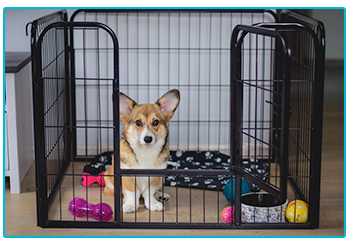Bringing a puppy into your home is an amazing adventure! But there’s so much advice out there, however, on how to train puppies that it can be hard to know where to start. One common question is whether or not you should crate train your new friend? It’s not suitable for everyone, or every dog, but the process can have many benefits for both you and your puppy*. In order to guide you through the process, here at The Insurance Emporium, we’ve come up with this essential guide to crate training your puppy!

Why crate train?
Crate training your new puppy can be a great way to housetrain your dog, as well as getting them used to being on their own for short periods of time. Canines are natural den dwellers, so having their own confined space, such as a crate, can provide them with a safe place to go if they’re feeling tired or stressed! Make sure you get a crate that’s the correct size for your pup. It’ll need to be large enough for them to turn around in and stretch once they’re fully grown.
How to begin
Start getting them used to going in and out of their new crate by placing treats or toys inside for them to fetch. You could also feed them their dinner in the crate by placing their food bowl inside towards the back. Make sure to praise your puppy when they enter the crate without fuss, ensuring they view it as a positive experience.
Closing the door

Once your furry friend is quite content to go in and out of the crate, sometimes staying inside for longer periods if they have a long lasting chew, you can start closing the door. To begin with make sure this is only for the briefest of periods, and remain next to the crate, so your pup knows you’re still there. You can begin increasing the amount of time the door’s closed gradually, always praising them when you let them out!
Building it up
If you’ve reached the stage where your puppy’s content to stay in its crate with you around, try getting up and moving around the room when they’re closed inside. Then you can gradually start leaving the room, building up to the point where they feel confident with you leaving the house while they’re safe in their den.
What not to do

Don’t overuse your dog’s crate! If you leave your furry friend crated whilst you’re out at work, and then again overnight, they could begin to feel frustrated and unable to move about as much as they need. If your dog suffers from separation anxiety, crate training might not be the answer – while it could stop them from destroying the sofa, they might equally hurt themselves trying to escape the crate. Consulting your vet or a dog trainer could be a better approach.
Helpful tips
Properly managed, crate training can be really rewarding! One top tip is to keep your puppy stimulated whilst they’re inside the crate, with toys and appropriate treats. This will keep them busy, and they’ll also come to associate their crate with positive experiences. Make sure not to make too much of a fuss over them when you open the crate door. Praise them for good behaviour, but over-fussing when you’re reunited could lead to separation anxiety later on!
Puppies can be so much fun, and it’s important to remember to enjoy spending time training them – before you know it they’ll be all grown up! If you’re welcoming a tiny canine into your home, it could be wise to consider taking out dog insurance to help protect them. At The Insurance Emporium, we offer a range of Dog Insurance that can be tweaked with a range of Optional Benefits to suit your pet and lifestyle. You could also get up to 30% discount^ when taking out your policy! Head to The Insurance Emporium to find out more!
* The Insurance Emporium does not recommend crate training puppies as the only way to housetrain your dog. It can be suitable to some households and dogs, but there are also a variety of alternatives. If you’re uncertain that crate training is best for your puppy, you could speak to your vet or a dog trainer for more information.
^ The 30% discount is made up of 20% Introductory Discount plus 10% Multi-pet Discount (if appropriate). The Introductory Discount is available for the first 12 premium payments on lunar and calendar monthly policies or one premium payment on annual policies.
All content provided on this blog is for informational purposes only. We make no representations as to the accuracy or completeness of any information on this site or found by following any link on this site. We will not be liable for any errors or omissions in this information nor for the availability of this information. We will not be liable for any loss, injury or damage arising from the display or use of this information. This policy is subject to change at any time.


